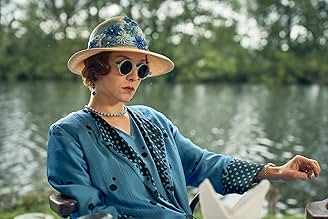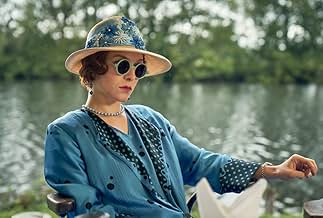IMDb RATING
6.1/10
5.6K
YOUR RATING
Jane Fairchild, a maidservant for the Niven family, is surprised when her wealthy neighbor, Paul Sheringham, invites her to spend the day with him.Jane Fairchild, a maidservant for the Niven family, is surprised when her wealthy neighbor, Paul Sheringham, invites her to spend the day with him.Jane Fairchild, a maidservant for the Niven family, is surprised when her wealthy neighbor, Paul Sheringham, invites her to spend the day with him.
- Awards
- 2 nominations total
Nathan Chester Reeve
- Dick
- (as Nathan Reeve)
Sope Dirisu
- Donald
- (as Sope Dìrísù)
- Director
- Writers
- All cast & crew
- Production, box office & more at IMDbPro
Featured reviews
I wanted to like this film but it strikes me as an empty book, an idea abut time but with no place to go.
Main story set in 1924 sees the country gentry still reeling from the slaughter of World War I Several families maintain the tradition of a picnic by the river on Mother's Day and recall the times when the children played and swam in the river. They're all dead now except for the youngest (Josh O'Connor), who's about to marry one of the daughters who was engaged to one of the boys now dead.
A maid in the house named Jane (Odessa Young), an orphan who's been "in service" since she was 14, is having a secret affair with the boy and meets with him one last time before he goes to the party to announce his engagement to the young woman.
The lady of the house (Olivia Colman) tells the maid she's lucky to have been an orphan. She can observe life without having to deal with the deaths of loved ones.
Jane eventually leaves the house and goes to work in a bookstore where she meets a philosopher and becomes his lover (there's talk of marriage). We also see Jane as an old woman (Glenda Jackson) who has indeed lived most of her life as an observer and as a famous writer.
Jane's life after she leaves the country house is sketchy and the viewer will likely feel cheated. We're not told very much ... yet the film runs for 104 minutes.
Jane strikes me as a character out of time and place. Would an uneducated house maid in 1924 be this self- possessed and confidant? Were interracial marriages possible in England in the 1930s and 40s? What kinds of books did Jane write? No details.
Young is good and O'Connor is better. Colman and Jackson combined have about 10 minutes of screen time. Colin Firth plays the "lord of the manor," but no one else registers.
There's a reference to Virginia Woolf's "Orando" and I guess that's meant to be a clue. Jane is a character out of time. Time is fluid and has no temporal barriers.
Main story set in 1924 sees the country gentry still reeling from the slaughter of World War I Several families maintain the tradition of a picnic by the river on Mother's Day and recall the times when the children played and swam in the river. They're all dead now except for the youngest (Josh O'Connor), who's about to marry one of the daughters who was engaged to one of the boys now dead.
A maid in the house named Jane (Odessa Young), an orphan who's been "in service" since she was 14, is having a secret affair with the boy and meets with him one last time before he goes to the party to announce his engagement to the young woman.
The lady of the house (Olivia Colman) tells the maid she's lucky to have been an orphan. She can observe life without having to deal with the deaths of loved ones.
Jane eventually leaves the house and goes to work in a bookstore where she meets a philosopher and becomes his lover (there's talk of marriage). We also see Jane as an old woman (Glenda Jackson) who has indeed lived most of her life as an observer and as a famous writer.
Jane's life after she leaves the country house is sketchy and the viewer will likely feel cheated. We're not told very much ... yet the film runs for 104 minutes.
Jane strikes me as a character out of time and place. Would an uneducated house maid in 1924 be this self- possessed and confidant? Were interracial marriages possible in England in the 1930s and 40s? What kinds of books did Jane write? No details.
Young is good and O'Connor is better. Colman and Jackson combined have about 10 minutes of screen time. Colin Firth plays the "lord of the manor," but no one else registers.
There's a reference to Virginia Woolf's "Orando" and I guess that's meant to be a clue. Jane is a character out of time. Time is fluid and has no temporal barriers.
Eva Husson's first English-language film, 'Mothering Sunday,' is a lusty, deeply melancholy portrayal of loss and its lasting impact that often feels disjointed and uneven. It's pretty to look at with impressive performances (and sizzling chemisty) from Odessa Young and Josh O'Connor but, unfortunately, doesn't offer much else.
Mothering Sunday. A lot of work has gone into this film in terms of congregating a good cast including a Olivia Coleman & Colin Firth. Some good acting and lovely cinematography, but unfortunately it was very, very slow. Trying to create an enigmatic and sultry atmosphere for a romantic love story but it just didn't come off.
The penny dropped that all the good romantic films watched in the past you 'bought in' to the characters and felt for them, urging them to succeed. Here I found we got to a point after 30 minutes where we couldn't care less about the two lovers or what happened to them. We weren't moved or brought to tears but felt complete apathy. Plus it was like an advert for cigarettes with so many smoked!
The penny dropped that all the good romantic films watched in the past you 'bought in' to the characters and felt for them, urging them to succeed. Here I found we got to a point after 30 minutes where we couldn't care less about the two lovers or what happened to them. We weren't moved or brought to tears but felt complete apathy. Plus it was like an advert for cigarettes with so many smoked!
The scenery is incredible, as is the performances of Colin Firth and Olivia Colman.
The rest of the movie is incredibly disjointed, and because there is no actual emotion or feeling between the two main characters, Odessa Young and Josh O'Connor, it quickly became annoying. There is only so much cigarette smoking a person can watch before you realize, I suppose, this is the point where the viewer is supposed to be emotionally touched. The problem is, I wasn't. Ever.
This felt like going to a beautiful restaurant and waiting so long for your meal that by the time it's gets there you want to throw the plate on the floor.
Much of the movie is beyond belief, such as the maidservant (who, between the wars, works for the wealthy Niven family), wandering naked through a manor house, seemingly unconcerned that the owners may show up...for over an hour.
At every turn, I kept thinking, here it is, we must be getting to the point...but 'the point' simply never happened.
A waste of talent and scenery, however it is worth watching simply for the performances of Firth and Colman. They are outstanding.
The rest of the movie is incredibly disjointed, and because there is no actual emotion or feeling between the two main characters, Odessa Young and Josh O'Connor, it quickly became annoying. There is only so much cigarette smoking a person can watch before you realize, I suppose, this is the point where the viewer is supposed to be emotionally touched. The problem is, I wasn't. Ever.
This felt like going to a beautiful restaurant and waiting so long for your meal that by the time it's gets there you want to throw the plate on the floor.
Much of the movie is beyond belief, such as the maidservant (who, between the wars, works for the wealthy Niven family), wandering naked through a manor house, seemingly unconcerned that the owners may show up...for over an hour.
At every turn, I kept thinking, here it is, we must be getting to the point...but 'the point' simply never happened.
A waste of talent and scenery, however it is worth watching simply for the performances of Firth and Colman. They are outstanding.
Greetings again from the darkness. Every writer has a story about what inspired them to put words on the page. What we have here is Eva Husson directing a script from Alice Birch (LADY MACBETH, 2016) who has adapted the 2016 novella from British author Graham Swift. We follow Jane Fairchild through three stages, as her work as a maidservant allows her to become "an occupational observer of life."
It's Mothers' Day 1924 and Jane (Odessa Young, SHIRLEY, 2020) is anticipating her latest romantic tryst with Paul Sheringham (Josh O'Connor, EMMA., 2020). Both know this is their final time together, and they take full advantage. Jane's employers, Godfrey and Clarrie Niven, are meeting Paul's parents for a celebratory luncheon with Emma (Emma D'Arcy), the 'proper' woman Paul is to marry. Oscar winner Colin Firth (THE KING'S SPEECH, 2010) and Oscar winner Oliva Colman (THE FAVOURITE, 2018) play the Nivens, and deaths from WWI hang over all of these families like the darkest of clouds.
The story is told in non-linear fashion, with Jane and Paul's final lovemaking session being that which all other events seem to revolve. We also spend some time with Jane in her 40's as she is living with her philosopher husband Donald (Sope Dirisu), and then in her 80's as she is celebrated as a renowned and prize-winning author. In this last stage, Jane is surprisingly played by the great Glenda Jackson, a two-time Oscar winner (A TOUCH OF CLASS, 1973, and WOMEN IN LOVE, 1969), who has only appeared in a handful of TV movies these past thirty years. Ms. Jackson turns 86 next month, and spent time as an elected member of Parliament. She's always been an interesting person, and it's terrific to see her back on the big screen - even if she only gets a couple of brief scenes followed by one substantial one near the end.
It's a beautiful film and it's sensuously photographed, though maybe a bit odd in that it focuses so diligently on the visuals (thanks to cinematographer Jamey D Ramsay), while actually following a woman's journey into writing. Love (or lack of it) and grief and life's transitions are all on display, as are the harsh realities of class differences. Ms. Young and Mr. O'Connor are both terrific, and though she has minimal screen time, we are stunned again at just how much emotion Ms. Colman can convey with her face.
Memories and recollections of "that day" play a crucial role as the mature Jane wrestles with writing her novel ... one that her publisher expects to be a thriller. Of course, we watch as Jane's story plays out, so we know where her writing is headed. The film has a vagueness to its storytelling that prevents us from ever fully engaging with Jane or any of the rich, sad people, yet it's such a beautiful film to look at that we never seem to mind.
In theaters on April 8, 2022.
The story is told in non-linear fashion, with Jane and Paul's final lovemaking session being that which all other events seem to revolve. We also spend some time with Jane in her 40's as she is living with her philosopher husband Donald (Sope Dirisu), and then in her 80's as she is celebrated as a renowned and prize-winning author. In this last stage, Jane is surprisingly played by the great Glenda Jackson, a two-time Oscar winner (A TOUCH OF CLASS, 1973, and WOMEN IN LOVE, 1969), who has only appeared in a handful of TV movies these past thirty years. Ms. Jackson turns 86 next month, and spent time as an elected member of Parliament. She's always been an interesting person, and it's terrific to see her back on the big screen - even if she only gets a couple of brief scenes followed by one substantial one near the end.
It's a beautiful film and it's sensuously photographed, though maybe a bit odd in that it focuses so diligently on the visuals (thanks to cinematographer Jamey D Ramsay), while actually following a woman's journey into writing. Love (or lack of it) and grief and life's transitions are all on display, as are the harsh realities of class differences. Ms. Young and Mr. O'Connor are both terrific, and though she has minimal screen time, we are stunned again at just how much emotion Ms. Colman can convey with her face.
Memories and recollections of "that day" play a crucial role as the mature Jane wrestles with writing her novel ... one that her publisher expects to be a thriller. Of course, we watch as Jane's story plays out, so we know where her writing is headed. The film has a vagueness to its storytelling that prevents us from ever fully engaging with Jane or any of the rich, sad people, yet it's such a beautiful film to look at that we never seem to mind.
In theaters on April 8, 2022.
Did you know
- TriviaThe film marks the first appearance of Academy Award winner Glenda Jackson in a theatrical release in over 30 years, having last appeared in Le roi du vent (1989), as well as the penultimate film role of her lifetime.
- GoofsIn the cycling scenes it is obvious that it is late summer or early autumn (long grass, mature green and yellow leaves on the trees etc) while the plot is set around Mothering Sunday in spring.
- Quotes
Samuel: You looked like you're about to... do an Ophelia.
Emma Hobday: Are you allowed to speak to me like that?
Samuel: Like what? Like I have read Shakespeare?
- ConnectionsFeatured in Projector: Mothering Sunday (2022)
- SoundtracksWe Plough the fields, and scatter
(uncredited)
Lyrics by Matthias Claudius, translated by Jane M. Campbell
Music attributed to Johann A.P. Schulz
Recited by Odessa Young and Josh O'Connor
- How long is Mothering Sunday?Powered by Alexa
Details
- Release date
- Countries of origin
- Official sites
- Language
- Also known as
- Mothering Sunday
- Filming locations
- Production companies
- See more company credits at IMDbPro
Box office
- Gross US & Canada
- $275,352
- Opening weekend US & Canada
- $9,322
- Mar 27, 2022
- Gross worldwide
- $2,260,859
- Runtime1 hour 44 minutes
- Color
- Aspect ratio
- 1.66 : 1
Contribute to this page
Suggest an edit or add missing content










































